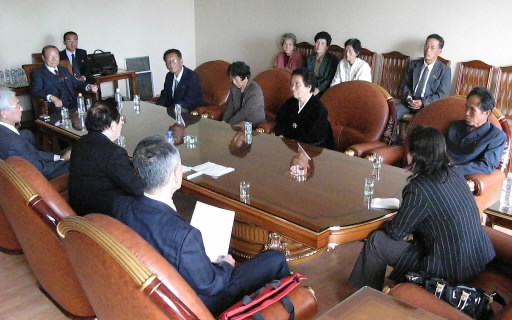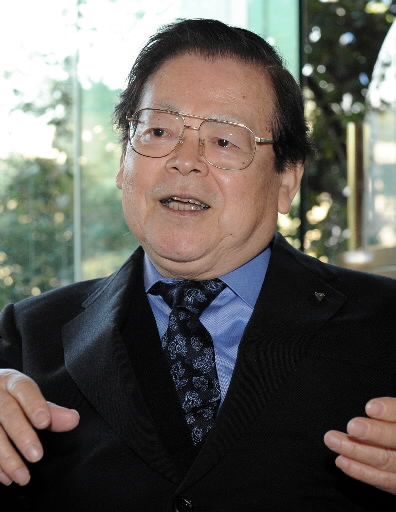Hiroshima Prefectural Medical Association unable to provide health checkups for A-bomb survivors in North Korea
Oct. 20, 2011
by Yumi Kanazaki, Staff Writer
Shizuteru Usui, president of the Hiroshima Prefectural Medical Association, and his team, who were undertaking a visit to North Korea in an effort to provide health checkups for A-bomb survivors residing there, returned to Japan via Beijing on October 16. Although they were unable to conduct the checkups due to a lack of support from the North Korean government, they still carried out a number of surveys inquiring about patients’ health conditions.
The medical team is comprised of eight members, including six medical doctors and two assistants. During their stay in North Korea, from October 11 to 15, they met with ten A-bomb survivors in Pyongyang and the nearby city of Sariwon. Among these ten people, nine had experienced the atomic bombing of Hiroshima. Ranging in age from their 60s to their 80s, the group included two individuals who were exposed to the blast while in their mother’s womb.
All of the survivors suffer from gastrointestinal disease and anemia. They appealed for “concrete medical aid, not simply surveys” and “proper checkups in Japan.”
The medical team also exchanged views with a local organization of A-bomb survivors, the North Korean A-bomb Survivors’ Association for Peace and the Prevention of Nuclear War, as well as the North Korean chapter of the International Physicians for the Prevention of Nuclear War (IPPNW). Dr. Usui currently serves as the president of the Japan chapter of IPPNW.
Based on the contents of the interviews conducted with these survivors, the Hiroshima Prefectural Medical Association will discuss its future course of action with regard to providing support for A-bomb survivors residing in North Korea, despite the lack of diplomatic relations between the two nations.
Following his return from North Korea, the Chugoku Shimbun spoke with Dr. Usui about the conditions involving the A-bomb survivors there and the mission of his association to provide these people with medical support.
What were your impressions upon meeting the A-bomb survivors?
The North Korean survivors suffer from the same health problems and fears of discrimination as the Japanese. One person told us that “Out of eight siblings, five suffered from cancer.” Another said that “My parents hid the fact that they had experienced the atomic bombing, so I didn’t know anything until I fell ill.”
The North Korean government has apparently issued an A-bomb survivor’s certificate, which enables them to receive preferential medical attention. Even so, they told me that they think they can receive better checkups in Japan and that they want medicine. It reaffirmed my view that providing them with medical support is an urgent task.
Why were you unable to conduct the checkups?
It seems that they weren’t ready to receive us, as the Korean Workers’ Party had been holding events until right before our visit. At the same time, I heard some criticism, such as “In the end, people who come from Japan don’t help us at all” and “In the first place, our citizens suffered the atomic bombing because of Japan’s colonial rule.”
Still, we were able to carry out detailed interviews with the survivors. I think that made it a meaningful visit.
What will be your next course of action in providing support?
Our two nations are contending with certain problems, such as the lack of diplomatic relations and the abduction issue. However, as doctors, we seek to provide humanitarian relief that is unfettered by these political problems. We believe that no matter where A-bomb survivors live, they should receive equal treatment.
We would like to grasp the number of A-bomb survivors through their use of survivor’s certificates and explore the possibility of holding local checkups, like those being held in North America and South America, and supplementing these local checkups with treatment in Japan.
(Originally published on October 17, 2011)
Shizuteru Usui, president of the Hiroshima Prefectural Medical Association, and his team, who were undertaking a visit to North Korea in an effort to provide health checkups for A-bomb survivors residing there, returned to Japan via Beijing on October 16. Although they were unable to conduct the checkups due to a lack of support from the North Korean government, they still carried out a number of surveys inquiring about patients’ health conditions.
The medical team is comprised of eight members, including six medical doctors and two assistants. During their stay in North Korea, from October 11 to 15, they met with ten A-bomb survivors in Pyongyang and the nearby city of Sariwon. Among these ten people, nine had experienced the atomic bombing of Hiroshima. Ranging in age from their 60s to their 80s, the group included two individuals who were exposed to the blast while in their mother’s womb.
All of the survivors suffer from gastrointestinal disease and anemia. They appealed for “concrete medical aid, not simply surveys” and “proper checkups in Japan.”
The medical team also exchanged views with a local organization of A-bomb survivors, the North Korean A-bomb Survivors’ Association for Peace and the Prevention of Nuclear War, as well as the North Korean chapter of the International Physicians for the Prevention of Nuclear War (IPPNW). Dr. Usui currently serves as the president of the Japan chapter of IPPNW.
Based on the contents of the interviews conducted with these survivors, the Hiroshima Prefectural Medical Association will discuss its future course of action with regard to providing support for A-bomb survivors residing in North Korea, despite the lack of diplomatic relations between the two nations.
Interview with Dr. Usui: Providing support is an urgent task
Following his return from North Korea, the Chugoku Shimbun spoke with Dr. Usui about the conditions involving the A-bomb survivors there and the mission of his association to provide these people with medical support.
What were your impressions upon meeting the A-bomb survivors?
The North Korean survivors suffer from the same health problems and fears of discrimination as the Japanese. One person told us that “Out of eight siblings, five suffered from cancer.” Another said that “My parents hid the fact that they had experienced the atomic bombing, so I didn’t know anything until I fell ill.”
The North Korean government has apparently issued an A-bomb survivor’s certificate, which enables them to receive preferential medical attention. Even so, they told me that they think they can receive better checkups in Japan and that they want medicine. It reaffirmed my view that providing them with medical support is an urgent task.
Why were you unable to conduct the checkups?
It seems that they weren’t ready to receive us, as the Korean Workers’ Party had been holding events until right before our visit. At the same time, I heard some criticism, such as “In the end, people who come from Japan don’t help us at all” and “In the first place, our citizens suffered the atomic bombing because of Japan’s colonial rule.”
Still, we were able to carry out detailed interviews with the survivors. I think that made it a meaningful visit.
What will be your next course of action in providing support?
Our two nations are contending with certain problems, such as the lack of diplomatic relations and the abduction issue. However, as doctors, we seek to provide humanitarian relief that is unfettered by these political problems. We believe that no matter where A-bomb survivors live, they should receive equal treatment.
We would like to grasp the number of A-bomb survivors through their use of survivor’s certificates and explore the possibility of holding local checkups, like those being held in North America and South America, and supplementing these local checkups with treatment in Japan.
(Originally published on October 17, 2011)









